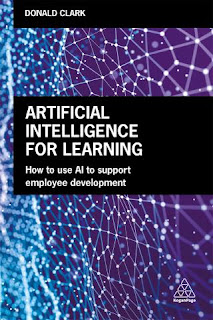Organisations need to have a strategic view of AI, especially in learning. This is technology that learns itself, that gets better through learning, that is used by learners. It reached 100 million in 2 months, and now hundreds of millions, the fastest ever adoption of a new technology. It is already a global technology.
Above all, you need to see it strategically. There is no imperative to use this tech but there is an imperative to consider its use. Sure, it is OK to say no but you should have a reason for saying no, as this is the technology of the age. I've been saying this in three books, lots of articles and a ton of keynotes for 7 years and it is now happening. This is the new internet, only smarter.
1. Trick is to get down and use it. AI has been largely invisible. you've been using it for ages. Now it has been foregrounded. It is there right on your table. You can play with this tech because it is online and free. That baseline feel for what it can do becomes quickly apparent, List your top five problems. Then go at it to see of the tools can help.
2. But that is not enough. You must get advice on inputs. These tools are only as good as their users ability to use them. Word does not make you a novelist and ChatGPT does not make you a consultant or expert. Prompting, is a skill, a skill that needs to be learned. Having to together a list of 100 prompt tips, this is not easy, as you need to understand how the underlying technology works and how to squeeze the best out of it.
3. Don’t get bogged down in one dimension, such as cheating in assessments. That is a sideshow and simply reveals the weakness of old practices. Think big not small. Think strategically and expansively about the big needs in your organisation. List them and reflect on how these tools can help.
4. Take a wider view of AI. It is not all LLMs (Large Language Models). It is used in dozens of other learning contexts. I have outlined many of them in ‘AI for Learning’. Think about applying this technology across the entire learning journey; engagement of learners (marketing also), support, personalisation, adaptive learning, feedback, content creation, curation, performance support and assessment. There has been an explosion of innovation in the first few weeks after the release of ChatGPT - be part of that.
5. Think about how this fits the new paradigm of, not courses, but performance support, hitting those sweet spots when learners really need stuff, not loading everything up front in a course. That’s the way things are going - learning in the flow of life. Think learning, not
6. Ask people who have been doing this for some time and get a plan of action, not just a keynote at your conference or quick webinar, although that helps get the ball moving. Create a sense of urgency as this technology is moving faster than you can schedule such events.
7. Remember that this is moving fast. It is not about ChatGPT. Within weeks Bing was released, ChatGPT 4 is here, as are other potential services from Google and many others. The new timescale is weeks not months. This is about your strategy for the future not what is available today.
I’ve been in this game for a long time doing real projects with real learners in the real world. AI is a big bang event in learning. Happy to help if I can.
If you need help with strategy, we can help. Contact me on LinkedIN or just email me.
donald.clark@hotmail.co.uk

No comments:
Post a Comment